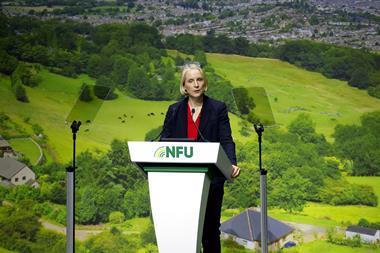Last week, margin-threatened suppliers found a new ally in the form of the Secretary of State for Environment, Food and Rural Affairs. In what was no doubt a lively meeting, Hilary Benn – doing his bit to keep the economy afloat – called on supermarket chiefs to look after their suppliers better by speeding up payments.
So did they take any notice? Did they heck. Just days after the meeting, Tesco was hauling suppliers into its Cheshunt HQ and asking for help to deliver on its promise of being Britain’s Biggest Discounter.
The Grocer understands that a major chunk of Tesco’s supply base has been asked to pop in to renegotiate terms – some apparently have been asked for up-front payments to support marketing and promotions, others to lower their prices and some have had their payment terms changed from 30 days to 60.
So much for the Government health warnings. In any case, Defra now appears to be distancing itself from the affair – asked for a reaction to the Tesco move, a spokeswoman says the department does not comment on hearsay. No chance of Hilary Benn riding to suppliers’ rescue, then. It’s difficult to argue with Tesco’s logic. Tesco says it is simply responding to the cash-strapped consumer’s demand for lower prices after two years of massive price inflation and is asking suppliers to help it achieve this goal.
“Our customers are facing tough times as a result of the economic slowdown and they are looking to us to help,” says a spokesman. “We have already launched hundreds of new products, but they also expect us to continuously negotiate the very best deals on their behalf. This is what we have been doing with some of our most significant suppliers this week.”
Suppliers won’t be hit too hard, he insists, as their costs have begun to drop. “Commodity prices have started to fall, easing the pressure on businesses a little and offering the opportunity for us to work with suppliers to do even more for customers,” he says.
Even if they do feel the pain, Tesco had little choice but to try and reduce prices for consumers, agrees Jonathan Pritchard, retail analyst at Oriel Securities. It’s just a part of the normal retailer-supplier dynamic and Tesco is simply doing what it has to do to stay ahead of the competition and indeed what its shoppers expect it to be doing. It may be unfortunate for the suppliers concerned, but “in an economic downturn, suppliers are the first to be squeezed”, he says.
The legal side
But aren’t there rules against this kind of thing? Well not really, according to one leading competition lawyer.
“What Tesco appears to be doing is certainly contrary to the spirit of the new code of practice and the Competition Commission’s report in general,” he says. “The problem for suppliers is that the new code is still not in force while the old code is still active in theory – and we all know how ineffective that has been.”
Tesco may have deliberately taken action before the new code comes into force.
“It certainly appears to be a cavalier approach from Tesco, which is bound to have an adverse effect on the consumer in the long run,” he says. “This sort of pressure on suppliers will directly affect investment and innovation and will ultimately limit choice. However, I can understand why it would try and force the issue now, as the Competition Commission or the OFT may be unwilling to get involved in any disputes until the code is brought into force.”
In the suppliers’ shoes
None of this, of course, will make suppliers feel any better about their lot this week. One global branded supplier that was informed Tesco would now be paying within 60 days rather than 30 accused the retailer of short-termism that could ultimately damage the economy.
“Tesco says it is looking after consumers, but consumers need to accept that certain goods have a certain value and this value chain needs to be preserved,” he argues. “What Tesco is doing is just a short-term solution, but ultimately suppliers will be forced to outsource abroad to meet these demands, and that will hurt the economy.”
Tesco informed the company without warning or opportunity to discuss the situation, claims the supplier. In a letter of response, he argued that the change in payment terms were in breach of the original supply agreement and that he would not accept it, but admits there is little else he can do and that Tesco will probably start paying later. Where Tesco leads others will inevitably follow, leading to an even greater squeeze on margins, warns the supplier.
“I expect the other grocers will follow suit,” he says. “But we are also worried that Tesco will come back in December when many companies are due to renegotiate their deals and ask for even more.”
Another major food supplier that was asked for an up-front cash payment agrees Tesco’s actions are jeopardising the entire supply chain.
"Tesco says it’s looking after hard-pressed consumers, but it’s certainly not looking after hard- pressed suppliers,” he says. “No doubt there are other suppliers waiting in the wings ready to take our place, but I suspect all Tesco suppliers already supply at very competitive margins.”
However, he doesn’t think the revised code or even the much-vaunted introduction of an ombudsman to scrutinise these dealings will prove effective. “It would be a very brave organisation that reports such a dominant player to the authorities,” he says.
The ombudsman debate
The creation of a watchdog to ensure fair dealings between suppliers and major retailers was a key remedy suggested by the Competition Commission following its two-year investigation into the UK grocery market.
It is trying to secure a voluntary agreement from the UK’s biggest retailers on the remit of the ombudsman to ensure the regulator is introduced quickly. Without this agreement, it will be up to Government to legislate, a much more drawn-out process.
Even those who support the concept of an ombudsman believe it is at least two years away, and will probably be a watered-down version. The dream of an effective ombudsman becoming a reality receded further this week, as Asda became the latest retailer to come out against it, after Tesco and Sainsbury’s had previously raised objections to the idea.
Asda told the Competition Commission that an ombudsman would hamper relationships between retailers and suppliers and lead to an increase in prices. The retailer’s objection – that an ombudsman would be inherently biased towards suppliers – has drawn derision from the competition lawyer, who dealt with a number of supplier organisations during the Commission’s inquiry.
“I am astonished by this attitude. To be against the ombudsman is to be against the principle of fair dealing,” he argues. “I would have thought the supermarkets would be much better off with an ombudsman than risk having a fired-up OFT under John Fingleton watching over them at every turn.”
The Commission is due to issue a draft order in relation to the revised Grocery Supply Code of Practice next month in the wake of a two-month consultation with retailers and suppliers.
However worthwhile an ombudsman may prove to be, for the time being at least, beleaguered suppliers will have to battle on in the face of rising retailer pressure. Tesco may have been the first to turn the screw, but it almost certainly won’t be the last.
So did they take any notice? Did they heck. Just days after the meeting, Tesco was hauling suppliers into its Cheshunt HQ and asking for help to deliver on its promise of being Britain’s Biggest Discounter.
The Grocer understands that a major chunk of Tesco’s supply base has been asked to pop in to renegotiate terms – some apparently have been asked for up-front payments to support marketing and promotions, others to lower their prices and some have had their payment terms changed from 30 days to 60.
So much for the Government health warnings. In any case, Defra now appears to be distancing itself from the affair – asked for a reaction to the Tesco move, a spokeswoman says the department does not comment on hearsay. No chance of Hilary Benn riding to suppliers’ rescue, then. It’s difficult to argue with Tesco’s logic. Tesco says it is simply responding to the cash-strapped consumer’s demand for lower prices after two years of massive price inflation and is asking suppliers to help it achieve this goal.
“Our customers are facing tough times as a result of the economic slowdown and they are looking to us to help,” says a spokesman. “We have already launched hundreds of new products, but they also expect us to continuously negotiate the very best deals on their behalf. This is what we have been doing with some of our most significant suppliers this week.”
Suppliers won’t be hit too hard, he insists, as their costs have begun to drop. “Commodity prices have started to fall, easing the pressure on businesses a little and offering the opportunity for us to work with suppliers to do even more for customers,” he says.
Even if they do feel the pain, Tesco had little choice but to try and reduce prices for consumers, agrees Jonathan Pritchard, retail analyst at Oriel Securities. It’s just a part of the normal retailer-supplier dynamic and Tesco is simply doing what it has to do to stay ahead of the competition and indeed what its shoppers expect it to be doing. It may be unfortunate for the suppliers concerned, but “in an economic downturn, suppliers are the first to be squeezed”, he says.
The legal side
But aren’t there rules against this kind of thing? Well not really, according to one leading competition lawyer.
“What Tesco appears to be doing is certainly contrary to the spirit of the new code of practice and the Competition Commission’s report in general,” he says. “The problem for suppliers is that the new code is still not in force while the old code is still active in theory – and we all know how ineffective that has been.”
Tesco may have deliberately taken action before the new code comes into force.
“It certainly appears to be a cavalier approach from Tesco, which is bound to have an adverse effect on the consumer in the long run,” he says. “This sort of pressure on suppliers will directly affect investment and innovation and will ultimately limit choice. However, I can understand why it would try and force the issue now, as the Competition Commission or the OFT may be unwilling to get involved in any disputes until the code is brought into force.”
In the suppliers’ shoes
None of this, of course, will make suppliers feel any better about their lot this week. One global branded supplier that was informed Tesco would now be paying within 60 days rather than 30 accused the retailer of short-termism that could ultimately damage the economy.
“Tesco says it is looking after consumers, but consumers need to accept that certain goods have a certain value and this value chain needs to be preserved,” he argues. “What Tesco is doing is just a short-term solution, but ultimately suppliers will be forced to outsource abroad to meet these demands, and that will hurt the economy.”
Tesco informed the company without warning or opportunity to discuss the situation, claims the supplier. In a letter of response, he argued that the change in payment terms were in breach of the original supply agreement and that he would not accept it, but admits there is little else he can do and that Tesco will probably start paying later. Where Tesco leads others will inevitably follow, leading to an even greater squeeze on margins, warns the supplier.
“I expect the other grocers will follow suit,” he says. “But we are also worried that Tesco will come back in December when many companies are due to renegotiate their deals and ask for even more.”
Another major food supplier that was asked for an up-front cash payment agrees Tesco’s actions are jeopardising the entire supply chain.
"Tesco says it’s looking after hard-pressed consumers, but it’s certainly not looking after hard- pressed suppliers,” he says. “No doubt there are other suppliers waiting in the wings ready to take our place, but I suspect all Tesco suppliers already supply at very competitive margins.”
However, he doesn’t think the revised code or even the much-vaunted introduction of an ombudsman to scrutinise these dealings will prove effective. “It would be a very brave organisation that reports such a dominant player to the authorities,” he says.
The ombudsman debate
The creation of a watchdog to ensure fair dealings between suppliers and major retailers was a key remedy suggested by the Competition Commission following its two-year investigation into the UK grocery market.
It is trying to secure a voluntary agreement from the UK’s biggest retailers on the remit of the ombudsman to ensure the regulator is introduced quickly. Without this agreement, it will be up to Government to legislate, a much more drawn-out process.
Even those who support the concept of an ombudsman believe it is at least two years away, and will probably be a watered-down version. The dream of an effective ombudsman becoming a reality receded further this week, as Asda became the latest retailer to come out against it, after Tesco and Sainsbury’s had previously raised objections to the idea.
Asda told the Competition Commission that an ombudsman would hamper relationships between retailers and suppliers and lead to an increase in prices. The retailer’s objection – that an ombudsman would be inherently biased towards suppliers – has drawn derision from the competition lawyer, who dealt with a number of supplier organisations during the Commission’s inquiry.
“I am astonished by this attitude. To be against the ombudsman is to be against the principle of fair dealing,” he argues. “I would have thought the supermarkets would be much better off with an ombudsman than risk having a fired-up OFT under John Fingleton watching over them at every turn.”
The Commission is due to issue a draft order in relation to the revised Grocery Supply Code of Practice next month in the wake of a two-month consultation with retailers and suppliers.
However worthwhile an ombudsman may prove to be, for the time being at least, beleaguered suppliers will have to battle on in the face of rising retailer pressure. Tesco may have been the first to turn the screw, but it almost certainly won’t be the last.


















No comments yet